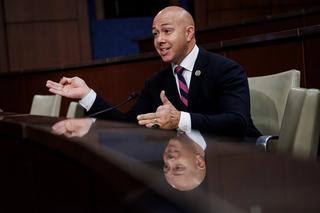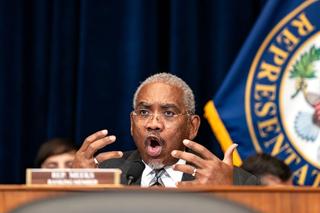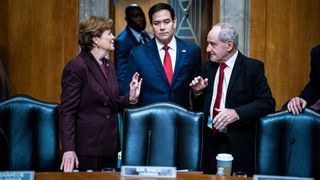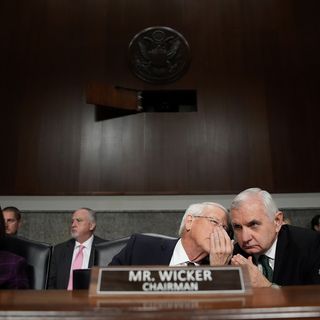What are the Foreign Relations Committees?
The Senate Foreign Relations Committee (SFRC) and the House Foreign Affairs Committee (HFAC) oversee all legislation related to US engagement with the world. These committees are responsible for authorising Department of State, Foreign Operations, and Related Programs funding measures.1 Collectively, the members exercise several specific foreign policy powers, including the powers to declare war, approve weapons transfers to foreign countries and authorise the funding for foreign assistance programmes and other State Department initiatives. The SFRC has unique constitutional authorities for ratifying treaties, deciding upon US foreign interventions and setting international borders and boundaries.
The Foreign Relations Committees have a reputation for delivering bipartisan legislative actions. However, since the most recent session began, commentators have worried that these committees may be poised to trend away from bipartisanship and enthusiastically implement an agenda driven by President Trump.2 In the 119th Congress, the Foreign Affairs Committees are chaired by Republicans, in accordance with their majorities in both chambers.
What are their subcommittees?
The Foreign Relations Committee members in the Senate and House both sit across seven subcommittees with varied regional and functional areas of responsibility. These committees run roughly parallel in each chamber.
Members to watch in the 119th Congress
The Senate
James (Jim) Risch
Position: Chair, Senate Foreign Relations Committee
Seat: Republican, Idaho
Time spent in Congress: 16 years
Time as chair or ranking member: Chairman 2025-present, 2019-2020; Ranking Member 2021-2024
Other committees: Committee on Energy and Natural Resources; Select Committee on Intelligence; Select Committee on Ethics; Committee on Small Business and Entrepreneurship.
Who are they?
Risch is currently serving his third term as Idaho’s junior senator, behind senior senator Michael Crapo. Before joining the Senate, Risch served briefly as the governor and lieutenant governor of his state. Though a conservative senator, Risch’s precise place on the spectrum of Republican foreign policy attitudes is somewhat difficult to gauge. Indeed, previous USSC analysis noted that Risch had a limited record of public commentary on foreign policy issues before assuming a senior role on the Committee.3 He was described during the first Trump administration as “a soft-spoken Trump ally” whose foreign policy views are not easily characterised.4 Risch has described himself as “much more transactional, depending upon the situation” than his Republican colleagues when it comes to alliances.5 In this Congress, Risch has pushed State Department employees to “faithfully serve the American people by executing the President’s foreign policy vision” or to “consider alternate employment,”6 in line with the tone struck by Secretary of State Marco Rubio, with whom Risch shares a close relationship forged during Rubio’s senate career.7 At the same time, as Committee Chairman, Risch has sought to accommodate the priorities of both Republicans and Democrats through empowering subcommittees to craft their own legislative agendas and supporting bipartisan resolutions on consensus issues,8 though Georgetown’s Lugar Centre, which ranks legislators on bipartisanship, grades Risch’s record of bipartisan legislative actions as middling compared to other Senate colleagues.9

What should Australians know?
Allies and partners
Risch’s approach to alliances and partnerships can be characterised as tough love; he is simultaneously a supporter of modernising and empowering key alliances,10 and uncompromising in demanding that those allies assume greater responsibility for their own defence.11 He has argued that “America cannot be the policeman to the world,”12 but has also insisted that the US can and should “lead” in multiple global theatres simultaneously.13 Like his Armed Services Committee counterpart Roger Wicker (R-MS), Risch is a proponent of enhancing collective deterrence in East Asia, including through more regular exercises with allies and even the redeployment of US tactical nuclear weapons on the Korean Peninsula,14 but has also said that frontline allies must spend more on their own defence to complement US investments.15
On Europe, Risch has voiced strong support of NATO amid criticisms of the alliance from the Trump administration and dismissed the idea that Washington will seek to terminate the pact.16 As recently as February, he joined his Democratic SFRC colleague to urge the Trump administration and foreign partners to repurpose frozen Russian sovereign assets for transfer to Ukraine.17 He frequently calls for European allies to step-up their own contributions to collective deterrence across the full spectrum of statecraft,18 including on defence spending levels. It remains to be seen the extent to which Risch is willing to stand in opposition to the administration on the issue of the Russian invasion of Ukraine; commentators have criticised Risch’s broad silence in the aftermath of the acrimonious Trump-Zelenskyy summit in February 2025.19
China
Risch regards strategic competition with China as systemic, ideological and multi-domain. He has described China as the “most significant long-term risk to the United States” across military, economic and cultural factors,20 warning that a global order “based on democracy and based on the rule of law, is where this planet should go if it’s going to have a future.”21 This was most neatly captured in the Senator’s proposal of the “Strengthening Trade, Regional Alliances, Technology, and Economic and Geopolitical Initiatives Concerning China Act (the STRATEGIC Act)” in July 2020 - and again in March 2021 and September 2024 - intended to serve as “a blueprint to advance bipartisan cooperation in all aspects of the competition with China,”22 though seemingly never rolled into the annual State Department authorisation bill and passed into law.
Risch is particularly interested in the economic dimensions of strategic competition, urging for collaboration with Europe and NATO to address vectors of Chinese foreign and industrial interference. He was a vocal proponent of the Chips for America Act, which sought to strengthen US domestic manufacturing of semiconductors, and has pushed for fundamental reforms to US export control laws and technology release processes to offset what he views as “China’s overwhelming manufacturing advantage,”23 a position informed by the experiences of leading technology companies in his district with Chinese industrial espionage.24 Risch has published multiple reports calling for full-spectrum collaboration with European partners to combat China’s efforts to “undermine prosperity, security and good governance in every region of the globe.”25 This has included advocating for collective “economic hardening” against Chinese influence,26 calling for upgrades to “standards for research security, strategic investments, and procurement in defense-relevant sectors” across the alliance, and accounting for “scenarios involving Chinese state interference” short of direct combatant contributions in US-NATO military contingency planning.27 He has also demonstrated a willingness to work with Democratic colleagues on key legislation related to China; Senator Risch joined his Democratic SFRC counterpart Senator Jeanne Shaheen (D-NH) in March 2025 to introduce a bill to stem the flow of fentanyl travelling from China into the United States.28
Taiwan
Risch has led the committee’s efforts to deter the forceful reunification of Taiwan with mainland China, and to streamline US foreign military financing (FMF) for Taipei,29 warning that any change in the cross-Strait status quo could have “disastrous effects” on US economic and national security interests.30 Previously,Risch introduced the Taiwan Deterrence Act in 2021 with the aim of deterring Chinese aggression by boosting FMF to Taiwan to US$2 billion per year.31 More broadly, Risch has embraced opportunities to internationalise support for Taiwan.32 He has worked with ranking member Senator Shaheen to advance several bipartisan resolutions reaffirming Taiwan’s right to participate in international organisations and countering the “false narrative” that the UN resolution 2758 grants China sovereignty over Taiwan.33 He also consistently endorses Taiwan’s right to participate in international institutions, including the United Nations and the WHO.34 He has commented that “the United States’ ‘one China policy’ is not the same as China’s ‘One China Principle’ and that suggestions to the contrary “deny Taiwan’s ability to engage with international organisations.”35
AUKUS
Risch has been a vocal advocate for accelerating Australia-US-UK cooperation through both pillars of AUKUS. He has framed Pillar I cooperation on submarines as crucial for offsetting “China’s overwhelming manufacturing advantage” through building a collective industrial base.36 In September 2024, Risch told Sky News that AUKUS would be fast-tracked under a Trump administration.37 Interestingly, he committed that the United States will transfer Australian submarines even if the US submarine industrial base fails to meet its own production targets,38 a position at odds with the more conditional support offered by the likes of Senator Roger Wicker (R-MS) and key Pentagon nominees in the Trump administration like Elbridge Colby.
On Pillar II, Risch has been forward leaning in encouraging “fundamental reform of U.S. export control laws and technology release processes” to enable that cooperation.39 For instance, In early 2023, Risch introduced the Torpedo Act (S 1471) which, among other things, recommended regulatory reforms to US defence trade controls essential to the successful implementation of AUKUS Pillar II, helping to inform the legislation which eventually passed to that effect through in the 2024 NDAA.40 Indeed, Risch has expressed frustration with what he views as an incremental approach to AUKUS Pillar II that places the US at “grave disadvantage” in technological competition with China. While he has endorsed the prioritisation of Japan as a potential future partner to AUKUS Pillar II,41 he has also warned against prematurely expanding AUKUS to include additional partners, stating that the three countries still need to “get the basics of AUKUS right” before considering a broadening of the initiative’s membership.42
Foreign policy spending
Risch is a fiscal hawk, but has broadly supported robustly funding State Department national security priorities, arguing that “U.S. foreign assistance spending must be strategic, aligned with U.S. national interests, and must eliminate duplication and waste.”43 On the one hand, he has a long history of voting against raising the debt ceiling and continued deficit spending, and instead advocates for “pro-growth policies” that balance the federal budget.44 In 2023, Risch rejected the debt ceiling increase arguing that “if Idahoans live within their means, the federal government should do the same”.45 On the other hand, Risch has previously broken with Republican colleagues to vote to sustain State Department and USAID funding, resisting calls to reprogram the money to military readiness and arguing that, despite its relatively small size, the impact of State Department resourcing on US national security “can’t be measured in dollars.”46
Risch appears to favour rightsizing current government spending rather than vastly increasing appropriations, including through greater scrutiny of State Department activities. For instance, Risch criticised the Biden administration’s FY2025 presidential request for the State Department for focusing more on climate change “pet projects” than Ukraine, Israel and competition with China,47 and has criticised the Department for “hiding information from Congress” on how certain funds are being spent.48 Yet he has also bemoaned the funding of US national security priorities like Ukraine through the sorts of “short-term emergency packages” that have fallen afoul of Congressional politics in the recent past.49 He has requested greater congressional oversight on State Department spending initiatives targeted at strategic competition, including resourcing new US embassies to counter Chinese influence.50
Jeanne Shaheen
Current position: Ranking Member, Senate Foreign Relations Committee
Seat: Democrat, New Hampshire
Time in Congress: Senate 2009-present; House of Representatives 1990-1996.
Time as chair or ranking member on SFRC: 2025 – present.
Other committees: Senate Appropriations Committee (Chair of the Commerce, Justice, Science Appropriations Subcommittee); Senate Armed Services Committee (senior member); Senate Committee on Small Business and Entrepreneurship.
Who are they?
Widely respected in US politics for her “brand of low-drama leadership,”51 Jeanne Shaheen is a former small business owner, congresswoman and governor of New Hampshire.52 She is the first woman in US history to be elected to serve as both a governor and a senator for her state, and the first woman to serve as Chair of the Senate Foreign Relations Committee (SRFC). Shaheen is a member of all three major committees in the Senate with influence over US foreign policy: the SFRC, the SASC, and the Appropriations Committee.53 These appointments have afforded Shaheen multifaceted understanding and oversight of US global commitments. This year is Shaheen’s first year occupying the role of Ranking Member on the Foreign Relations Committee, replacing interim member Senator Ben Cardin (D-MD) who held the role following the unceremonious departure of Senator Robert Menendez (D-NJ) from the chamber in 2024. Though well-versed in Indo-Pacific issues, early indications from this Congress suggest that Shaheen will focus largely on European, the Middle Eastern and Latin American issues.54 She has confirmed that she will not seek re-election in the 2026 Midterm Elections,55 a decision which will leave Democrats searching for a new Senate foreign policy heavyweight.
What should Australia know?
Allies and partners
Senator Shaheen has described US alliances as “one of the United States’ greatest assets” and has specifically endorsed key relationships in the Indo-Pacific.56 She joined a congressional delegation to the Philippines, Vietnam, Japan and South Korea last year, where she deemed Indo-Pacific partners “critical components of our national security apparatus” and reaffirmed US commitments to extended deterrence on the Korean Peninsula and continued trilateral engagement with Japan and Korea.57 In her capacity as co-chair of the Senate NATO Observer Group, Shaheen has linked transatlantic and Indo-Pacific security challenges, on the basis that “what happens in Europe […] affects the rest of the world and affects what they’re doing in Asia.”58 Relatedly, she has warned of the interdependency between the Trump administration’s approach to Ukraine and America’s credibility with its Asian security partnerships.59

China
Consistent with most of her Senate colleagues, Shaheen is seized by the threat presented by China to the interests of the United States and its partners. She has advanced legislation on technology security; foreign investment; and industrial policy to enhance America’s tools of statecraft in strategic competition with China. However, Shaheen’s view of that competition is more global than regional, and she has frequently connected the China challenge to issues of great personal interest in Europe and Latin America.60 Like her House Democrat colleagues Reps. Gregory Meeks (D-NY) and Adam Smith (D-CA), Shaheen has endorsed sustained engagement and bilateral dialogue to manage tension in the US-China relationship, noting that China remains one “of the largest and most consequential trade partnerships in the world.”61 She supported proposals in 2022 and 2023 to establish a China Grand Strategy Commission to “bring together those in the public and private sectors to study and evaluate our political, economic and security relationship with China to avoid unnecessary escalation between our two nations, while ensuring the United States maintains a competitive advantage.”62
Taiwan
Compared with the focus of many other Congressional figures on the military elements of the US-Taiwan relationship, Shaheen has focussed largely on Taiwan’s diplomatic profile, its relationships with other countries, and its right to participate in international institutions like the United Nations. Shaheen and Senator Risch have co-sponsored motions in support of Taiwan, including those “reaffirming that the “one China policy” of the United States and the similar policies of its partners are not equivalent to the “One China Principle” of the Chinese Communist Party (CCP)” and reiterating support for “Taiwan’s meaningful participation in international organisations.”63 Consistent with her regionally interdependent view of strategic competition, Shaheen introduced legislation entitled the Building Options for the Lasting Security of Taiwan through European Resolve (BOLSTER) Act in the previous session to support improved coordination between Taiwan and European partners, including provisions that would simplify the transfer of US-origin defence equipment from European allies to Taipei,64 though which never became law.
AUKUS
Shaheen broadly supports AUKUS as a means of strengthening US capacity and standing in the Indo-Pacific, going as far as to state that “if we can't make something like AUKUS work with our closest partners, we're going to have challenges across the board.”65 Shaheen has listed the implementation of AUKUS, and particularly addressing US submarine industrial base capacity, as among her top priorities in considering Congressional funding measures.66 Part of this support is derived from the local interests of her constituency – Portsmouth Shipyard maintains Virginia-class submarines, so Shaheen expects that her state’s workers will make “an important contribution to the AUKUS submarine effort.”67 However, she has also expressed some concerns with respect to AUKUS implementation. For instance, she has co-signed several letters from Congress to President Biden seeking costings for AUKUS-related submarine industrial base investments,68 and has been among several senior Senate Democrats, including SASC Ranking Member Jack Reed, to repeatedly express concerns about Washington’s capacity to meet both its own and Australia’s submarine needs simultaneously.69
Foreign policy spending
On spending matters, Shaheen’s position in overarchingly one of fiscal responsibility. She has called for “reforms to every area of the federal budget” including defense and foreign policy spending,70 arguing that “a strong military no longer means simply having the most firepower.”71 At the same time, she has advocated for robust funding for both the Pentagon and the State Department. Like Gregory Meeks, Shaheen has denounced the cuts initiated by the Trump administration to US foreign assistance programs, describing the dismantling of such programs a “self-inflicted wound that will directly empower our adversaries like China”.72 She has expressed confusion with the Trump administration’s approach to defence and foreign policy resourcing, noting the dissonance between the Pentagon’s proposed 8 per cent cuts to spending in future years and the considerable increases to defence spending proposed by Congressional Republicans.73
The House
Brian Mast
Position: Chair, House Foreign Affairs Committee
Seat: Republican, Florida, 21st district
Time spent in Congress: 8 years
Time as chair or ranking member: 2025 – present.
Other committees: House Transportation and Infrastructure Committee.
Who are they?
A fifth-term congressman, Mast’s appointment to chair of the Foreign Affairs Committee in this Congress was considered surprising, and a demonstration of the sway of Trump-aligned members.74 A ‘dark horse’ candidate for the position, he surprised commentators by winning the support of Republican committee members abruptly following his presentation.75 He assumes the chairmanship of HFAC as the successor to Michael McCaul, a high-profile supporter of AUKUS and Australia-US defence cooperation in Congress, whose six year term-limit as Chairman elapsed at the end of the previous Congress.76 Mast served as a civilian volunteer in the Israeli military and has been frequently provocative in his outspoken support for Israel’s defence and opposition to humanitarian aid efforts for Palestinians. He has already clashed publicly with HFAC Ranking Member Gregory Meeks after claiming there are “very few innocent Palestinian citizens.”77 A US Army veteran with 12 years of military service, Mast was left a double amputee after an incident with an IED on deployment in Afghanistan.

Mast’s precise views on and interest issues of central relevance to Australia and the Indo-Pacific are far less evident than those of his predecessor. When he first joined Congress in 2017, Mast wrote of his concern for the abdication of the United States’ leadership role in the global community, but particularly with respect to the Middle East.78 This will likely make the activities of HFAC subcommittees and their Chairpersons – particularly on the East Asia and the Pacific subcommittee – much more important,79 particularly when Mast has stated that he does not view bipartisanship as a worthy end in itself.80 Indeed, Mast’s interests appear to reside primarily with the Middle East, congressional oversight, and eliminating so-called “woke” climate and diversity policies from the State Department, enthusiastically embracing what Mast calls the “purging of people through the State Department [and] other agencies where we’re freezing aid.”81
What should Australians know?
Allies and partners
In a January 2025 conversation at the Atlantic Council, Mast remarked “the goal is good policy that makes America the partner of choice.”82 Yet he has infrequently commented publicly on the priorities for US alliances and partnerships in Asia beyond Taiwan. His regional focus, illustrated in the subcommittees he has sat on in HFAC to date, has been on the Middle East and on Europe. Mast is a staunch Trump ally, and has frequently parroted the President Trump’s derision of European allies for not paying more for their defence – or for Ukraine’s – while funding “lavish social welfare programs and climate agendas.”83 In early 2024, Mast criticised the extent of ongoing US support for Ukraine and voted against supplemental appropriations, even though he has also described the war as “the largest tactical and strategic blunder in Russian history.”84 Following the fraught Trump-Zelensky summit in February 2025, Mast was frank that there was “nothing to criticise” from Trump and Vance’s reproach of the Ukrainian leader and echoed the administration’s calls for Europe to be a better security partner that “doesn’t need America” to undertake its defence.85
China
Consistent with the broader Republican caucus, Mast is definitive about the threat posed by China to the United States and its allies, claiming that “war is in the mind of the Chinese dictator”.86 Often, Mast’s public remarks on China are couched in familiar language of a war between democracies and communist regimes.87 He has also supported Congressional efforts to limit Chinese access to US markets and technology. In the previous Congress, Mast introduced the Undersea Cable Control Act which, though it never became law, aimed at working with partners on limiting China’s access to technologies capable of supporting undersea cables,88 while he supported legislation blocking entry visas and property ownership in the United States for CCP officials and their families.89
Taiwan
As a member of the Taiwan caucus in Congress, Mast has expressed continued support for the status quo of the island’s de facto independent existence, and has referred to the island as a “democratic country.”90 Among his most notable legislative initiatives directed at the Taiwan Strait, Mast co-led a bipartisan letter in 2024 expressing concern for PRC unilateral alteration of flight routes around Taipei.91 In a previous Congress, Mast cosponsored the Arms Export Delivery Solutions Act which, though it did not become law, aimed to accelerate the delivery of US military equipment sold to Taiwan and other US allies, proclaiming that “America needs to do more than handshakes and photo-ops” in support of Taipei.92
AUKUS
Mast’s views on AUKUS are largely unknown. At the time of writing, he is yet to publicly comment on either Pillar I or Pillar II in any significant way. Indeed, Mast was not named as a co-sponsor of any major pieces of House legislation related to AUKUS advanced during the previous Congress. Similarly, he is not a prominent voice in congressional discussion around US shipbuilding or the defence industrial base. That said, there are early indications that Mast is willing to take a strategic approach to reforming US export controls that would benefit AUKUS and other forms of US-Australian defence cooperation; in February 2025, a new task force was created in HFAC to improve processes around FMS and export controls.93 The authors’ private engagements have also suggested that AUKUS, including further export control reform and matters of financing for Pillar II projects, will remain a top HFAC priority under his chairmanship.94
Foreign policy spending
The available evidence suggests that Mast is more focussed on reducing waste and finding efficiencies than on pursuing larger foreign affairs budgets. Mast supports purging “tens and tens of billions of dollars” in aid programs, State department staff, and DEI policies, casting these cuts as “all very important and necessary steps to make sure that we secure America.”95 He has proven an outspoken critic of “ideological and unaccountable” public diplomacy spending.96 In a recent letter to then-Secretary of State Antony Blinken and the Hon. Samantha Power, administrator of USAID, Mast criticised the Department for “uncontrolled spending on programs that are incompatible with the United States’ interest abroad”, including on climate and LBGTQ+ initiatives.97 He formerly chaired the House Foreign Affairs Subcommittee on Oversight and Accountability, where he lambasted the State Department for “going rogue” in its use of US taxpayer dollars.98 In particular, he has criticised international humanitarian assistance or “America’s charity” to Gaza at the perceived expense of US citizens.99 More broadly, Mast has alleged that many US aid programs are “indefensible” and “literally betray America,” and has supported absorbing USAID into the State Department to more tightly control its activities.100
Gregory Meeks
Current position: Ranking Member, House Armed Services Committee
Seat: Democrat, New York 5th District
Time in Congress: 1998 – present.
Time as chairman or ranking member: Chairman January 2021 - January 2023; Ranking Member January 2018 – January 2019; January 2023 – present.
Other committees: House Committee on Financial Services
Who are they?
Gregory Meeks was elected to Congress in 1998. He represents New York’s 5th congressional district - one of the most diverse districts in the country. During his time leading congressional Democrats in HFAC, Meeks has focussed on advancing State Department personnel and diversity programs; securing funding for the United Nations; US responses to global humanitarian issues in the Middle East, Latin America, the Caribbean and Africa; the imposition of Russia sanctions and counter-influence efforts.101 As a long-standing proponent of US foreign aid efforts, he’s been critical of the Trump administration’s approach to USAID, stating that “what Trump, Musk, and the GOP are enabling is unserious and dangerous.”102 Though Meeks has generally supported Democratic and bipartisan bills and delegations related to strengthening US Indo-Pacific partnerships, most of his energies seem to have been invested in other regions of the world. Importantly, where Meeks had a strong relationship with former Republican HFAC Chairman Rep. McCaul, the contours of his relationship with Chairman Mast are less clear as yet.
What should Australia know?
Allies and partners
Meeks has consistently supported US engagement with and support for its international partners, as well as US participation in international institutions.103 He has framed the US alliance network as a “superpower that China simply does not have.”104 Though his comments on Asian partnerships are relatively sparse in comparison to some of his colleagues, the Quad stands out among Meeks’ interests. Under the Biden administration, he deemed the reinvigoration of the Quad, a “critical diplomatic arrangement”, as central to US global leadership and a demonstration of the strength of democracies.105 In 2024, he advanced a Quad Intra-Parliamentary Working Group to further engagement with Quad partners below the leaders’ level.106 To the extent that Meeks has pioneered legislation relevant to Asian partners, it has been targeted at humanitarian and governance issues (including with respect to US arms sales and the ongoing crisis in Myanmar).107 Meek has been consistent in his message that expanding and modernising US alliances and partnerships requires stable investment in the State Department and USAID to underwrite US soft power.108

China
Like his Republican counterparts, Meeks has been frank about the immense strategic challenge China represents to US national interests. He has supported bipartisan actions from HFAC to confront the varied threats presented by the PRC.109 One of his most significant efforts to this end was his chief sponsoring of the Ensuring American Global Leadership and Engagement (EAGLE) Act, which sought to establish an array of initiatives for countering PRC influence in the Indo-Pacific, including on supply chains, vaccine distribution and climate cooperation,110 though it did not pass the House. However, Meeks has opposed obstreperous rhetoric surrounding strategic competition and rejected views amongst some Republicans that diplomacy and engagement with China should be read as signs of weakness. In a 2023 Foreign Policy article, he wrote: “whether Republicans like it or not, China isn’t going anywhere…we cannot confuse hawkishness for strategy, bluster for strength…on some of the toughest issues we face like North Korea and Iran's nuclear programs, a real solution will have to include China at the table.”111
Taiwan
Meeks has struck a balance between supporting Taiwan’s independence through legislation and funding while calling for stability and dialogue with Beijing on cross-Strait issues. He joined Nancy Pelosi on her infamous visit to Taiwan in 2022 for engagements across economic, cultural and security vectors, declaring that Congress and the US writ large “just can’t kowtow and bow down, changing what we do because of Beijing's decision to be more aggressive.”112 In the aftermath, he emphasised both the importance of all sides maintaining the status quo and the significance of the United States redoubling its cooperation with Taiwan in light of mounting PRC aggression.113 Previously, Meeks’ 2021 EAGLE Act was criticised for omitting provisions on support for Taiwan that had appeared in the equivalent legislation in the Senate,114 though he has also led HFAC Democrats in supporting supplemental funding packages intended to contribute to strategic stability in the Indo-Pacific, including the Taiwan Strait.115 Meeks also co-sponsored the Taiwan Allies Fund Act proposed in 2024 by the Chair and Ranking Members of the House Select Committee on the Chinese Communist Party, intended to “support Taiwan’s international space and counter CCP coercion,”116 a bill recently reintroduced for Congressional deliberation.117
AUKUS
Over the past four years, Meeks has proven to be a strong supporter of AUKUS.118 He led some early legislative efforts to transfer submarines to Australia and enable the embedding of Australian workers into the US industrial base.119 That said, he has not embraced all aspects of AUKUS cooperation equally or unconditionally. For instance, Meeks and other HFAC Democrats supported formalising a standard of comparability against which Australia defence trade controls would need to be judged before any licensing exemptions could be made, in contrast with Republican proposals that sought to recognise Australia as already comparable.120 Meeks adopted this position on the basis of concerns that US technologies transferred to Australia would be at high risk of industrial espionage.121 Meeks has also opposed any alterations to prevailing US policy vis-à-vis the Missile Technology Control Regime – reforms regarded as essential to facilitating advanced capability development under AUKUS Pillar II and for sharing sensitive technology for producing missiles, drones, and other platforms122 – on the basis of disrupting global strategic stability, particularly with respect to Russia.123
Budget
Meeks strongly supports robust funding for US diplomacy, arguing that “we’ve got to make sure that we have the alternative to war”, and that “if you talk to any military man, they’ll say you have to make sure that diplomacy is happening at the highest levels”.124 He has spearheaded efforts to ensure the full funding of US contributions to international institutions, including the United Nations.125Accordingly, he is a fierce critic of sweeping cuts to State Department toplines and staffing, including House Republicans’ proposals to cut as much as 30% from recent State Department and foreign operations budgets. He joined his Democratic Senate counterpart Jeanne Shaheen to oppose recent Trump administration efforts to unilaterally revise recruiting, performance, evaluation, retention and personnel standards at the State Department,126 and to freeze USAID programs.127 Meeks argues that budget-cutting measures undercut US capacity to prevail in strategic competition, as well as put Americans, US influence and people around the world at risk: “that’s not leading. That’s not competing. That’s not being present where we need to be present.”128
Appendix 1. Members of the Foreign Relations Committees
House of Representatives
Republican
- Brian Mast (R-FL 21)
- Michael McCaul (R-TX 10)
- Christopher Smith (R-NJ 4)
- Joe Wilson (R-SC 02)
- Scott Perry (R-PA 10)
- Darrell Issa (R-CA 48)
- Tim Burchett (R-TN 02)
- Mark Green (R-TN 07)
- Andy Barr (R-KY 06)
- Ronny Jackson (R-TX 13)
- Young Kim (R-CA 40)
- Maria Elvira Salazar (R-FL 27)
- Bill Guizenga (R-MI 04)
- Amata Radewagen (R-AS-AL)
- Warren Davidson (R-OH 08)
- Jim Baird (R-IN 04)
- Thomas Kean Jr. (R-NJ 07)
- Michael Lawler (R-NY 17)
- Cory Mills (R-FL 07)
- Keith Self (R-TX 03)
- Ryan Zinke (R-MT 01)
- James Moylan (R-GU-)
- Anna Paulina Luna (R-FL 13)
- Jefferson Shreve (R-IN 06)
- Sheri Biggs (R-SC 03)
- Michael Baumgartner (R-WA 05)
- Ryan Mackenzie (R-PA 07)
Democrat
- Gregory Meeks (D-NY 05)
- Brad Sherman (D-CA 32)
- Gerald Connolly (D-VA 11)
- William Keating (D-MA 09)
- Ami Bera (D-CA 06)
- Joaquin Castro (D-TX 20)
- Dina Titus (D-NV 01)
- Ted Lieu (D-CA 36)
- Sara Jacobs (D-CA 51)
- Sheila Cherfilus-McCormick (D-FL 20)
- Greg Stanton (D-AZ 04)
- Jared Moskowitz (D-FL 23)
- Jonathan Jackson (D-IL 01)
- Sydney Kamlager-Dove (D-CA 37)
- Jim Costa (D-CA 21)
- Gabe Amo (D-RI 01)
- Kweisi Mfume (D-MD 07)
- Pramila Jayapal (D-WA 07)
- George Latimer (D-NY 16)
- Johnny Olszewski (D-MD 02)
- Julie Johnson (D-TX 32)
- Sarah McBride (D-DE-)
Senate
Republican
- James Risch (R – ID)
- Pete Ricketts (R – NE)
- Dave McCormick (R – PA)
- Steve Daines – (R – MT)
- Bill Hagerty (R – TN)
- John Barrasso (R-WY)
- Mike Lee (R-UT)
- Rand Paul (R-KY)
- Ted Cruz (R-TX)
- Rick Scott (R-FL)
- John Curtis (R-UT)
- John Cornyn (R-TX)
Democrat
- Jeanne Shaheen (D-NH)
- Chris Coons (D-DE)
- Chris Murphy (D-CT)
- Tim Kaine (D-VA)
- Jeff Merkley (D-OR)
- Cory Booker (D-NJ)
- Brian Schatz (D-HI)
- Chris Van Hollen (D-MD)
- Tammy Duckworth (D-IL)
- Jacky Rosen (D-NV)








